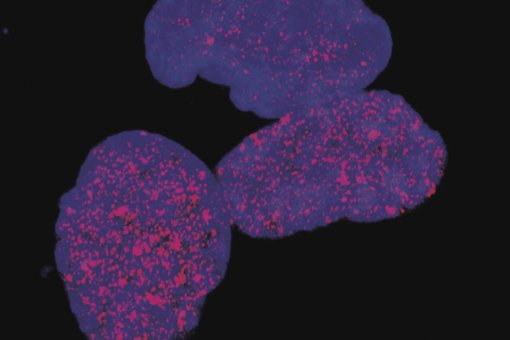Images
Contact

“Bisthiazol” is funded by the Agency for Assessing and Marketing Research Results, run by the University of Barcelona (UB), and the Santander Bank.
The Project entitled “Development of new anticancer agents - Bisthiazol”, which involves scientists at the Institute for Research in Biomedicine (IRB Barcelona), IDIBELL and the UB, has been approved by the UB’s Agency for Assessing and Marketing Research Results (acronym in Catalan AVCRI) in the 2009-2010 second call for applications for project assessment. AVCRI and the Santander Bank, an organisation that funds the programme, have awarded the project 200,000 euros over two years.
Given that there is currently a lack of drugs that show efficacy against most cancers, the objective of the “Bisthiazol” project is to determine whether a family of chemical compounds, identified in labs at IRB Barcelona, is viable for the development of new anti-tumour agents. This family of compounds has the capacity to restore the suicide function of tumour cells. In many kinds of cancer, the normal process through which unwanted cells are removed (apoptosis) stops working. This then leads to the growth of tumours and causes resistance to chemotherapy. Tumour cells, when released from the signalling that orders them to self destruct in the presence of mutations, can thus grow and multiple in an uncontrolled fashion. One of the main factors that fails during this process is the anti-tumour protein p53, which is inactive in 50% of cancers. The compounds have been shown to restore cell death function in cancer cells in vitro assays, independently of p53; on the basis of this capacity, the researchers believe that the compounds identified could be developed as new pro-apoptotic drugs. This discovery is highly relevant because it provides new information about the signalling pathways that activate cell death and will contribute to the design of alternative anti-tumour treatments.
The design and synthesis of the molecules has been done entirely at IRB Barcelona, under the direction of Fernando Albericio and Rodolfo Lavilla, members of the Chemistry and Molecular Pharmacology programme of IRB Barcelona and professors at the UB. Joan Gil, researcher at IDIBELL and professor at the UB, undertook the study of the mechanisms and biological activity of the compounds. The first results arose from the Miriam Miquel’s PhD thesis, which is supervised by Lavilla at IRB Barcelona.
The scientists will now study diverse aspects to validate the compounds, including their degree of toxicity in mice, to elucidate the mechanisms of cell action, and to check the anti-tumour activity in several kinds of cancer lines.
The development of pro-apoptotic drugs to treat most kinds of cancer has a significant scientific, social and economic impact. The support the “Bisthiazol” project receives from the UB and Santander Bank has been given on the basis of its highly innovative nature and its high commercial potential. This study may lead to new patent applications and the development of technology-based enterprises, both strategic missions of IRB Barcelona laboratories.
About IRB Barcelona
The Institute for Research in Biomedicine (IRB Barcelona) pursues a society free of disease. To this end, it conducts multidisciplinary research of excellence to cure cancer and other diseases linked to ageing. It establishes technology transfer agreements with the pharmaceutical industry and major hospitals to bring research results closer to society, and organises a range of science outreach activities to engage the public in an open dialogue. IRB Barcelona is an international centre that hosts 400 researchers and more than 30 nationalities. Recognised as a Severo Ochoa Centre of Excellence since 2011, IRB Barcelona is a CERCA centre and member of the Barcelona Institute of Science and Technology (BIST).




